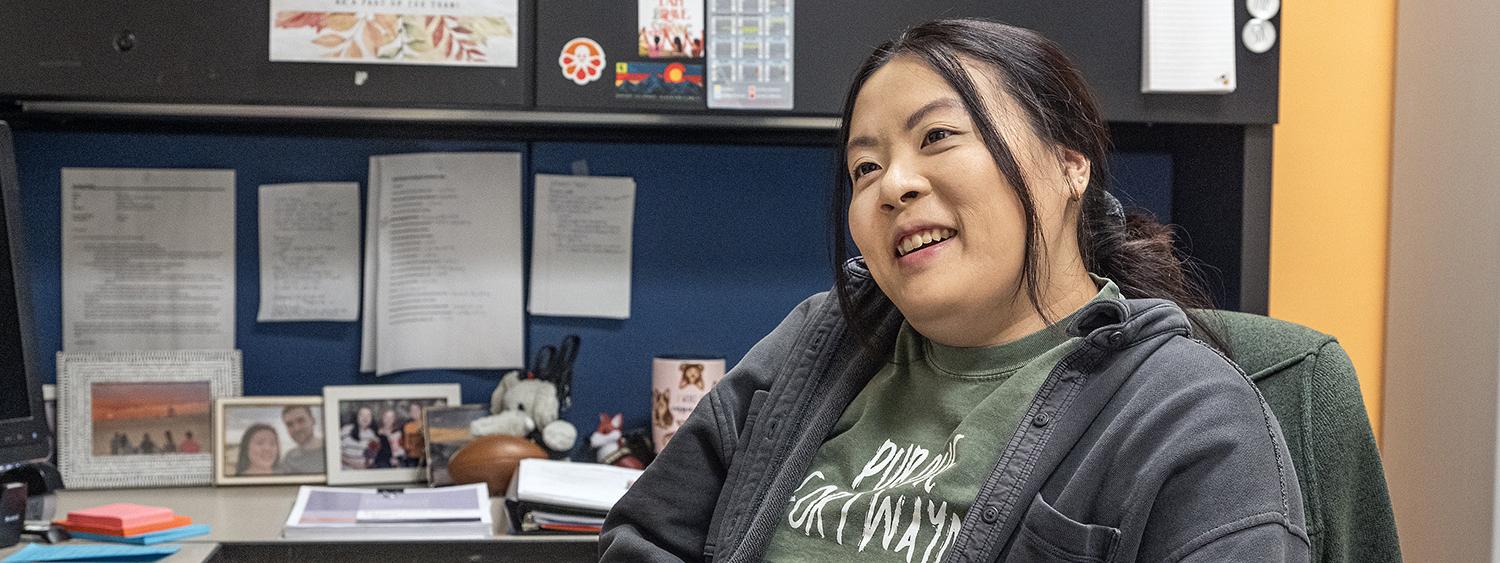
Grad student supports those struggling with addiction
By Blake Sebring
January 31, 2024
Carolyn Pang, B.S. ’21, began building her leadership résumé at Purdue University Fort Wayne in 2019 when she restarted the student club Psi Chi, the international honor society for psychology, which works to encourage and advance the science of the discipline. Though only a sophomore, Pang helped get the club going again, served as president for two years, and built a foundation that continues.
“As the advisors of Psi Chi, Jody Ross and I were so glad that Carolyn said yes,” said Sara Simpson, administrative assistant for the Department of Psychology. “She entered with many doubts about being a leader, but blossomed in this role. During her two years as president, she supported students and fellow officers with warmth and humor, especially during the pandemic months.”
Because of her work, the Fort Wayne branch of the American Association of University Women selected Pang to attend the National Conference for College Women Student Leaders in 2020. Even as a graduate student, Pang continues to support Psi Chi’s current efforts.
As to why Pang chose psychology, she remembers when specialists would come into her home to treat her brother who is three years younger and deals with autism. She was fascinated by their work and results and even volunteered at a location where he was receiving treatment.
“I thought I was going to be teaching them a lot of everyday skills,” Pang said, “but they taught me how to have patience and compassion.”
Those qualities have continued to grow as Pang finishes her master’s degree. She’s chosen a difficult but always-growing field helping others deal with addictions, saying she’s always been interested in how substances affect the brain and body. She’s learned more while leading group treatment meetings during several internships. One day, she realized she loved what she was doing. It simply felt right.
“Just hearing their stories and the trauma they’ve experienced, their experiences with addictions, and losing loved ones because of drugs and overdoses and because of their addictions,” Pang said. “Just hearing their stories and how isolating it was. I wanted to be that person in their corner. I firmly believe everybody should have at least one person in their corner.”
It’s a role Pang has grown into, said David Young, professor emeritus at PFW, who once told his student she had the right amount of spunk to be effective.
“Carolyn is a bright student who always asked the `next-level’ question—going deeper in her understanding of psychopathology and the mechanisms to promote health and growth,” Young said. “Furthermore, she is persistent in her work and has incredible energy. Substance abuse is, by definition, a disease of relapse, and successful treatment often requires this persistence, energy, and patience.”
Pang fully accepts the irony of her current internship position. Had anyone suggested she’d become the graduate intern for Student Leadership a few years ago when she started college, her response would have been a haughty, “Yeah, right,” followed by laughter.
By the time Pang arrived at PFW in 2018, she’d already attended two other schools and started out thinking she was supposed to become a mathematics major. Now she’s in her third year of graduate school studying counselor education with a focus on clinical mental health counseling, realizing she is indeed a leader and knowing in her heart the profession she’s destined for.
“I was always that quiet kid, never really outgoing,” Pang said. “I wanted to hear what other people thought, and then I would act on it, a follower, a set-an-example person, maybe. I’ve also learned that leadership is individualized by each person, and there is no set way or definition of what it looks like, or set of beliefs for what it is. Actually, it’s whatever you make it.”
For the most part, this relatively new wisdom is central to her work with others. She helps students identify leadership qualities they have within themselves, and then how to strengthen and hone those skills, teaching them how to be effective in their student organizations and extracurricular activities. Then she shows them how those skills will help them for the rest of their lives, personally and professionally.




